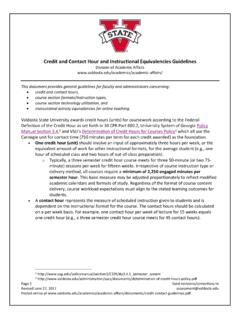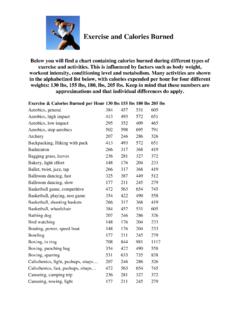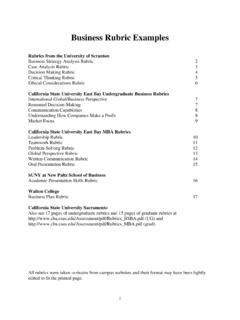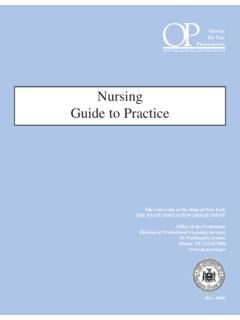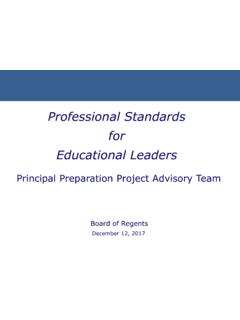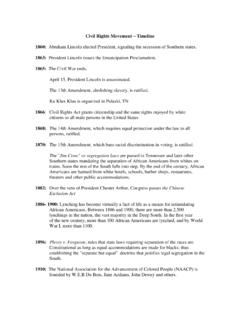Transcription of Payroll Policies and Procedures - Valdosta State University
1 Valdosta State University Human Resources & Employee Development Policies and Procedures Payroll Policies and Procedures With in excess of 3,500 checks issued monthly to faculty, staff and students and an annual Payroll in excess of $34 million, it is obvious that strict regulation of the Payroll process must be accomplished if we are to process pay checks in a timely fashion with minimum errors. This section covers basic Payroll Procedures , and employees should realize that certain inflexibilities are inherent if we are to meet Payroll deadlines, reporting deadlines and comply with myriad Federal, State and board of Regents Policies , while maintaining accurate records which are audited on an annual basis by the State of Georgia auditors. The Work Week Payroll Periods Salary Adjustments Salary Increases Payroll Deductions Salary Advances Garnishments of Wages Federal Tax Levy Vacation Checks Conformity With Federal Standards Use of the Time Clock Use of Time Sheets Final Checks Wage and Salary Administration Withholding of Pay 1.
2 On-Call Pay/Call Back 2. Holiday Pay SECTION The Work Week. The University work week begins at 12:01 Saturday and runs through 12 Midnight Friday. This is the standard work week of the University System as of January 1, 2000. Employees normally report for work at 8:00 and leave at 5:30 with one hour for lunch Monday through Thursday. On Friday employees report at 8:00 , have one hour for lunch and leave at 3 a. Individual Variations in Established Schedule. On occasion an employee may request authority from his or her supervisor to report at periods other than the established work schedule. Such variations must be approved in writing by the supervisor and the Department of Human Resources, so necessary Payroll and leave accrual adjustments can be made. Employees who fail to contact their supervisor regarding the reason for their absence and fail to show up for work for a period of three consecutive days will be considered to have abandoned their position from the University and will be terminated.
3 B. Departmental Variations in Established Schedule. Certain departments on campus cannot observe the standard work schedule due to the nature of the service they render. Examples include the Food Service Division, Public Safety, Plant Operations, Library, etc. each of which have extended work schedules. Employees in these areas may have work schedule variations to meet the departmental demands, but in no case should such variations result in a work week in excess of 40 hours on a regular basis. c. Break and Meal Periods. 1. Break Periods. Valdosta State University , in an effort to promote the safety and productivity of employees, affords a fifteen-minute break period for each four hours of scheduled work. Breaks are generally allowed during the employee's normal routines; however, certain departments may establish specified breaks to prevent loss of employee productivity. Break periods may not be accumulated or taken in conjunction with a lunch hour, vacation, holiday, etc. in that this would not serve the intended purpose of such time away from the work station.
4 2. Meal Periods. for employees working an eight hour shift in an around-the-clock operation ( , campus police), a meal break is not required, but the employee must be given the opportunity to eat while maintaining active on-duty status. Departmental guidelines regarding appropriate places to purchase a meal include a 500 yard perimeter around the core corridor of campus. Meals should be purchased and not eaten until the officer returns to his/her campus assignment. Any questions as to whether a business is within that corridor should be directed to management staff for clarification. Officers must also ensure that their area of responsibility is covered by other officers before leaving to pick up meals. d. Overtime. The need for overtime work is infrequent at the University as each department is encouraged to schedule its workload so as to accomplish its goals within the prescribed work week. In emergency situations, and when feasible, the department head should obtain prior approval for overtime work from the Vice President for Finance and Administration.
5 Payment for overtime will be made in accordance with the provisions of the Fair Labor Standards Act. Overtime premium pay results only in those cases when hours actually worked exceed 40 during the established work week. When such is authorized, the departmental budget will be charged, and it shall be the department head's responsibility to assure funding is available. Supervisors are advised that wage-hour regulations hold employers responsible for situations where an employee is permitted to attend phones and other duties during normal lunch hours. Employees should be encouraged to leave their work stations during periods when they are not officially on duty. SECTION Payroll Periods. The University has established two Payroll periods geared to salaried and hourly-paid personnel. a. Bi-Weekly Payroll /Student Payrolls. The bi-weekly Payroll is for hourly-paid employees who are on timecards/timesheets. The Payroll period for the bi-weekly Payroll begins at 12:01 Saturday and runs fourteen consecutive days.
6 Employees on a bi-weekly Payroll are paid on alternate Fridays by their immediate supervisors at the close of their normal work shift. Timesheets are due in the Payroll Office by 9:00 on the Monday following the pay period end date. b. Monthly Payroll . The monthly Payroll includes those employees who are considered exempt by the Fair Labor Standards Act. Monthly checks are issued on the last working day of each month, unless otherwise specified by official memorandum. Professional and Administrative-Exempt. Employees in this category are paid monthly and are not eligible for overtime premium. The only time records required are those to indicate time off (annual leave, sick leave, etc.) c. Calculation of Hourly Compensation (benefit purposes, budget, etc.) 1. Non-Exempt Personnel. Every employee of Valdosta State University has a base compensation rate which should not be confused with budgeted amounts. The final budget is a funding document which must assume each employee will work all hours each fiscal year, based on their equivalent full-time employment.
7 The standard work year of all non-exempt full-time employees is 2080 hours, whereas the budget is based on anticipated annual hours to be worked, which ranges from 2072 to 2096 hours. Therefore, the rate of compensation must be calculated based on the following formula (budgeted amount/equivalent full-time employment/annual hours in fiscal year). 2. Exempt Personnel. The budgeted amount for exempt personnel, including faculty, is the annual compensation and will not vary with annual hours in the fiscal year. The hourly rate of exempt personnel is determined by the formula (budgeted amount/equivalent full-time employment/2080 hours). 3. Benefit Base. Benefits that are determined by annual compensation are determined on the standard work year and would be based on the calculations stated above. d. Direct Deposit. Regular status employees may have their checks deposited directly in the bank of their choice at no cost for this service. Details are available on this benefit in the Payroll Office.
8 SECTION Salary Adjustments. Salary adjustments may occur whenever a new scale is approved by the board of Regents. Appropriate adjustments will be made to employees' salaries in positions affected as funds are made available. This action should not be confused with a promotion or similar action where there is a change in responsibility. a. Mid-Year Adjustments. Mid-year salary adjustments, absent compelling reasons, , promotions, demotions, transfers, etc., may be considered gratuitous and, therefore, illegal. Should such adjustments be deemed necessary, approval by the President, with a written request to the Chancellor clearly setting forth demonstrable changed circumstances relating to work assignments or other compelling reasons will be required. Approval by the Chancellor is required prior to effecting a change of salary in such cases. SECTION Salary Increases. Salary increases are normally made on the basis of merit at the beginning of each fiscal year, providing funds are made available from the State appropriation.
9 The decision to increase a person's salary is made after considering his or her record for the previous year as reflected in the performance evaluation and the prevailing salary scale within his or her particular job classification. It should be stressed that salary increases are not automatic. 1. Recommended salary increases are not subject to grievance unless there is a clearly demonstrated I intent of discrimination against an employee or class of employees based on any of the protected employment classes. 2. Pay grade adjustments, cost of living increases and equity adjustments which are made to upgrade the salary schedule of the University may occur at the beginning of the fiscal year contingent upon funding availability. Such adjustments are non-grievable, and in no case will an employee receive less than the merit or other salary consideration recommended by their supervisor. The salary increase policy is administered in the following ways: a. Merit and Cost of Living- Merit is a percent range based on performance.
10 Cost of living is a set figure on all classifications. When authorized these are administered at and under the direction of the System Office of the board of Regents for the University System of Georgia and become effective at the authorized adjustment date. b. Promotions- The opportunity for a promotion becomes available when: 1. an existing position with a higher pay grade becomes open allowing an employee to apply; 2. duties with greater responsibility are added to a department and a reclassification request for the existing position is approved with an associated higher pay grade; 3. a new position with a higher pay grade is added to a department and an employee within the department is hired into the position. c. Acting Assignment- A temporary pay increase may be given to an employee who is asked to take on the responsibilities of a higher level position for a limited time period until the position can be filled on a permanent basis. Justification for an acting assignment should be submitted in writing to Human Resources and Employee Development for approval.

